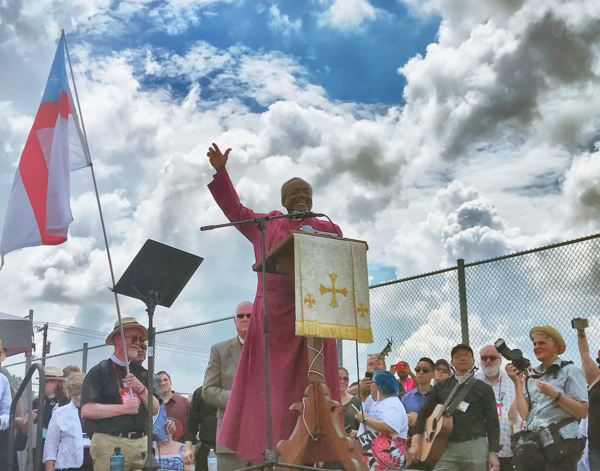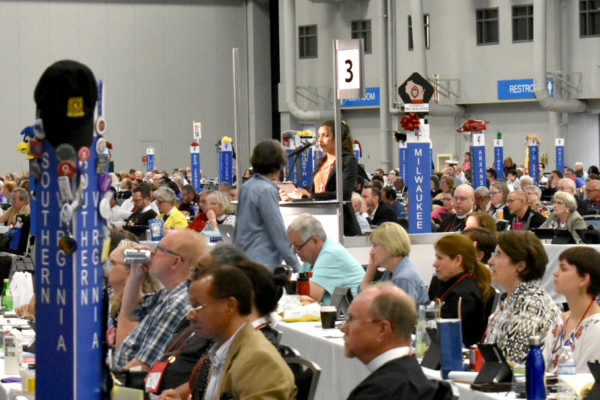
“We do not come in hatred, we do not come in bigotry, we do not come to put anybody down, we come to lift everybody up. We come in love,” Presiding Bishop Michael Curry told a crowd of more than 1,000 gathered in prayer at the T. Don Hutto Detention Center in Taylor, Texas. Photo: Frank Logue
[Episcopal News Service – Austin, Texas] If there was one issue that defied any expectation of controversy at the 79th General Convention, it was immigration.
Bishops and delegates arrived in Austin last week on the heels of a national uproar over the Trump administration’s “zero tolerance” policy toward immigration, particularly the decision to separate children from parents in detention. And despite the administration’s reversal on family separations, immigration policies continued to be a hot-button issue, including in the border state hosting the Episcopal Church’s triennial gathering.
But if the country remains divided over what to do about immigration, the thousands of Episcopalians gathered here presented a unified front in support of families who have been separated, of those facing deportation and of immigrants in general – through prayer, testimony, action and the unobstructed passage of legislation.
One of the defining moments of this General Convention was the prayer vigil held July 8 outside the Hutto Detention Center, an immigrant detention facility a little more than a half hour outside of Austin. A massive gathering of more than a thousand Episcopalians prayed and sang in support of immigrant parents and children who had been separated.
“We do not come in hatred, we do not come in bigotry, we do not come to put anybody down, we come to lift everybody up,” Presiding Bishop Michael Curry said in his sermon at the prayer vigil. “We come in love. We come in love because we follow Jesus, and Jesus taught us love.”
That spirit carried through to the church’s legislative process. About 25 people testified July 7 at a hearing on all resolutions related to immigration, and the Trump administration’s policies loomed large.
The Rev. Nancy Frausto, who was a featured speaker at the TEConversations joint session on racial reconciliation, testified at the hearing to her fear of deportation after President Donald Trump ended a policy of protection for “dreamers” like her who were brought to the United States illegally when they were children.
“The 800,000 Dreamers need to have the Episcopal Church stand behind them, and not just them but all immigrants,” Frausto said, speaking in favor of Resolution C033, which puts the church on record as respecting the dignity of immigrants and outlines how public policy should reflect that belief.
The Social Justice and Unites States Policy Committee, with the input received at the open hearing, combined some of the resolutions into three that encompassed many of the issues discussed. In addition to C033, the committee recommended A178, which takes a forceful stand against family separations and treatment of immigrant parents and children, and C009, entitled “Becoming a Sanctuary Church.”
The latter resolution encourages Episcopalians and congregations to reach out to and support immigrants facing deportation, including by providing physical sanctuary if they choose, but “this resolution does not call on them to do so,” committee member Daniel Valdez of the Diocese of Los Angeles said on the House of Deputies floor during debate on the resolution July 12.
“Sanctuary has a powerful theological grounding,” Valdez said while emphasizing the resolution’s intent, to encourage Episcopalians to make connections with undocumented immigrants, such as through legal assistance, advocacy or pastoral care.
The House of Bishops had passed the three resolutions without objection and without discussion in voice votes July 11, and the three were taken up together in the afternoon session July 12 in the House of Deputies.

Diana Marcela Abuchar Sierra, a member of the Official Youth Presence from the Diocese of Colombia, speaks in favor of immigration resolutions July 12 in the House of Deputies. Photo: David Paulsen/Episcopal News Service
Diana Marcela Abuchar Sierra, a member of the Official Youth Presence from the Diocese of Colombia, spoke out against the Trump administration’s immigrant detention policies during floor discussion of A178.
“I refuse to see how people who just want to better themselves are treated so inhumanely and cruelly,” Abuchar said in Spanish through an interpreter. “Please, as the Episcopal Church we must defend their rights and their dignity. As the Episcopal Church, we must raise their voices and be heard.”
Wendy Cañas, a deputy from the Diocese of New York, offered a similar sentiment in supporting C033.
“We are speaking for those who cannot speak for themselves,” she said. “We are also telling the the government … that the Episcopal Church will keep them morally accountable for sustaining and supporting the families in our country.”
As in the House of Bishops, no one spoke against any of the three resolutions in the House of Deputies, and the deputies were essentially unanimous in favor. All three voice votes passed without any audible “no” in the hall.
– David Paulsen is an editor and reporter for the Episcopal News Service. He can be reached at dpaulsen@episcopalchurch.org.
This post appeared here first: General Convention unites behind immigrants, in prayer, action, legislation
[Episcopal News Service – General Convention 2018]
